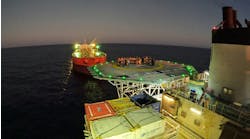By Joachim Åkesson, sales director, Ace Well Technology
Control line clamping is one of the most important, yet challenging elements of well completions. This is due in large part to the inherent safety risks it presents. Traditional control line clamping requires personnel to perform manual tasks inside the rig’s “red zone,” including fixing control lines onto downhole tubing, typically with cross-coupling clamps. Operators have long recognized the benefits that can be realized through increased automation of the control line clamping process. However, developing an efficient and reliable solution has proved challenging for the industry.
In 2021 Ace Well Technology (AWT) released the Ace Control Line Clamp (ACLC), which is designed to reduce the need for workers in the red zone by 50% and the time spent in the red zone by 30% by enabling automatic running of tubing clamps.
The ACLC delivers axial holding force of more than 40 tonnes and is deployable on any current rig. It is adapted from the Ace Ratchet Collar, a stop collar that serves as an alternative to centralizer subs and allows for installation anywhere on the tubing. In the ACLC design, the stop collar has a specially designed retention lid with designated spaces to hold the control lines. When running in hole, the retention lid is placed on the installation tool, which catches the control lines as it moves toward the completion string. The pre-installed parts of the ACLC can be fitted onshore, or on the pipe deck before being combined with the control lines themselves using the semi-automated arm—with no requirements for bolts, screws or nails. The ACLC exceeds latest test requirement defined in Equinor TR 2385 document encapsulation to hold on to umbilical configurations.
Case study
In 2023 AWT completed a pilot demonstration of the ACLC for a major Norwegian operator in the North Sea. The project saw the installation of 49 prototype 7-inch ACLCs.
The operation saw positive results, improving both the safety and efficiency of control line clamping on the rig. Running speeds exceeded expectations, verifying reduction of personnel in the red zone. Pre-installation on the tubing promotes standardization and reduction of parts inventories by eliminating the need to carry multiple sizes and types of cross-coupling clamps depending on the tubing connection.
Overall, the pilot run was deemed a success and demonstrated the current capabilities of the ACLC. Collaboration between AWT and the operator has been instrumental in advancing the technology and making well completions safer and more efficient by reducing worker exposure to high-risk activities.
AWT is currently in discussions with the operator to demonstrate fully automatic control line clamping installations, which would see all personnel completely removed from the red zone.
06.22.2023



